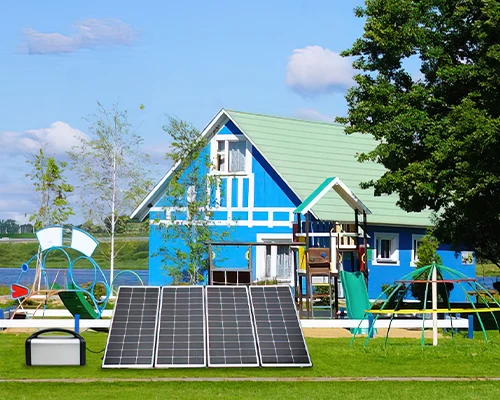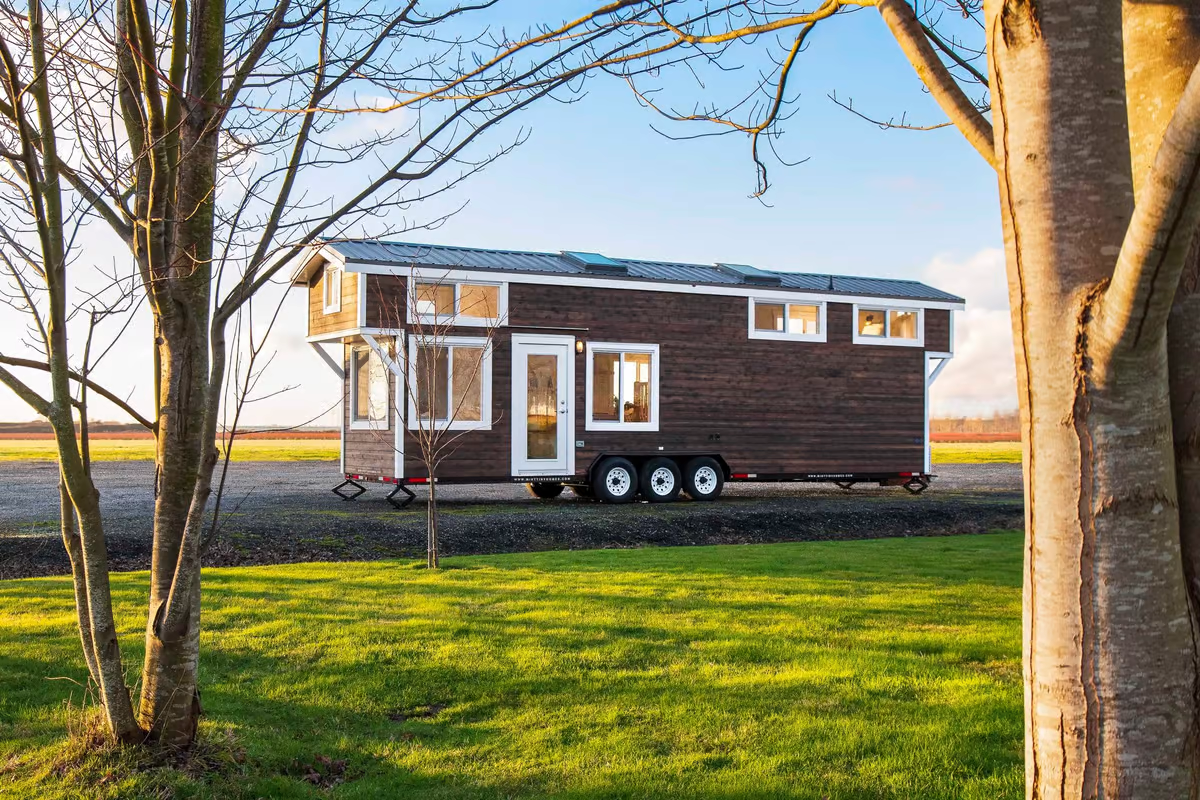Tiny homes, typically ranging from 100 to 400 square feet, have become a popular choice for individuals seeking a simpler, more sustainable lifestyle. Tiny houses can benefit greatly from off-grid solar systems, offering a reliable and eco-friendly power source. Specially designed tiny home solar panels cater to the unique energy needs of smaller living spaces.
This article explores the dynamics of off-grid solar systems, focusing on packages equipped with off-grid, providing a comprehensive guide for those seeking energy independence. From understanding the components to exploring Solar Panels for Tiny House and Tiny Home Solar Kit, let’s delve into the world of off-grid power solutions.

The Basics of Off-Grid Solar Systems:
Off-grid solar systems operate independently of the traditional power grid, making them ideal for remote locations or individuals seeking self-reliance. These systems generate electricity through solar panels, store it in batteries, and use inverters to convert it into usable power for homes or businesses.
Components of Off-Grid Solar System Packages:
Tiny home Solar kit: Portable solar panels are the heart of any off-grid solar system, capturing sunlight and converting it into electricity. sungold solar panels are designed to withstand all weather conditions and provide continuous renewable energy. Passed IP68 waterproof test certification, it is the preferred off-grid system supplier for off-grid living.
Batteries: Off-grid solar systems include batteries to store excess energy generated during sunny periods. This stored energy ensures a continuous power supply during cloudy days or nighttime, contributing to a consistent power output.
Inverter: An inverter is a crucial component that converts DC (direct current) electricity stored in batteries into AC (alternating current) electricity, which is commonly used in households and businesses.

Advantages of Tiny Home Solar Panels:
Energy Independence: Shed solar panels enable residents to generate their electricity, reducing dependence on traditional power sources.
Cost Savings: While the initial investment may seem significant, the long-term savings on energy bills make tiny home solar panels a financially sound decision.
Environmental Impact: Harnessing solar power is a clean and renewable energy solution, minimizing the carbon footprint associated with traditional energy sources.
Why do people use solar energy in small houses?
Whether on a small or large scale, people are converting their electrical systems to solar power for a myriad of reasons. Solar energy is much cheaper than it used to be and produces more energy from the same amount of sun. With incentives happening in so many different places, it’s hard not to convince yourself to switch to solar.
Save money on your electric bill
Converting to solar will quickly reduce any home’s electric bill. In a tiny house, you can greatly reduce your electric bill, sometimes ending up with a positive net result instead of paying for it. If you do it right, selling your solar energy back to the grid could end up being a little profitable.
Environmental protection and safety
The electrical system is powered by several different environmentally destructive methods that are further destroying the climate and the world as we know it. Solar energy is a clean, renewable source of energy and a safe source of electricity. Smaller solar systems are more localized and safer for everyone compared to massive power lines.
Adds value to your home
Today, everyone is looking for homes with solar power installed. They recognize the overall advantages and want to start with solar already established. By installing solar on your home, you can easily increase the value of your home while saving money throughout the year.
Off-Grid Living
Off-grid living has huge appeal for those who prefer an isolated lifestyle, and even for those who still want to stay connected. Relying on the grid for all of your electricity can be dangerous because when something goes wrong, you no longer have control. By going off the grid, you have access to power whenever you need it, no matter what power lines were down during the recent storm.
Determining the Solar Power Requirement for Your Tiny Houses
Before embarking on your solar journey, it’s vital to gauge your electricity necessities. Here are two methods to assess your power needs:
- Glance at your current utility bills.
- Total the energy consumption of all your planned appliances in the tiny house.
Opting for the latter method entails listing down your gadgets and their daily energy consumption, like so:
| Item | Watts | Usage Time (hours) | Energy (Wh) |
|---|---|---|---|
| Space heater | 1000 | 8 | 8000 |
| Refrigerator | 200 | 24 | 4800 |
| AC unit | 1000 | 7 | 7000 |
| Internet router | 6 | 24 | 144 |
| Laptop charging | 40 | 4 | 160 |
| Laptop running | 15 | 8 | 120 |
| 5 LED lights | 5 | 5 | 125 |
| Incandescent light | 60 | 5 | 300 |
| Cellphone | 5 | 5 | 25 |
| Radio | 1 | 7 | 7 |
| Well pump | 750 | 1 | 750 |
| Solar booster pump | 100 | 2 | 200 |
Adding these up, your daily energy requirement stands at 21,631 Wh.
With your electricity needs pinned down, it’s time to calculate the solar panel and battery storage prerequisites for your humble abode.
Advantages of Harnessing Solar Power for Tiny Houses
Transitioning to solar energy for your tiny home brings forth a myriad of benefits, aligning seamlessly with the core motivations behind tiny house living: environmental stewardship and financial prudence. Below, we delve into the primary advantages:
- Cost-Efficiency Through Reduced Utility Bills: As conventional electricity rates soar, solar power emerges as a beacon of financial relief. While tiny houses inherently boast diminutive utility bills due to their size, integrating solar panels can potentially eradicate or significantly diminish these expenses. This financial relief can be further amplified by residing in sun-drenched locales and leveraging net metering incentives.
- Championing Eco-Friendly Practices: If your heart gravitates towards tiny house living, chances are you’re an advocate for eco-conscious living. Solar energy stands as a stalwart ally in this endeavor. Unlike fossil fuels, solar power leaves no detrimental ecological footprint, curbing greenhouse gas emissions and minimizing particulate pollution. By opting for solar, you actively contribute to the preservation of our planet.
- Embracing Off-Grid Living: The unpredictability of blackouts and natural calamities underscores the vulnerability of grid-dependent living. Solar power empowers you to break free from this reliance, entrusting your energy needs to the sun’s unwavering radiance. With ample battery storage, you gain autonomy over your power supply, ensuring uninterrupted electricity even amidst grid failures. This off-grid lifestyle grants you the flexibility to relocate at will, taking your power source wherever you roam.
- Augmented Property Value: Installing solar panels not only enhances your tiny abode’s sustainability but also bolsters its market value. Prospective buyers are increasingly drawn to residences equipped with renewable energy infrastructure, willing to pay a premium for the promise of free, clean, and sustainable energy.
- Leveraging Financial Incentives: Governments offer a plethora of incentives to incentivize the adoption of solar power, ranging from rebates to tax breaks. These subsidies further sweeten the deal, making solar conversion a financially savvy move.
- Fostering Unparalleled Freedom: For owners of mobile tiny houses, solar power unlocks a world of boundless exploration. Unfettered by grid constraints, you can traverse remote terrains while basking in the comforts of modern living. Wherever your adventures take you, the sun remains a steadfast ally, supplying you with ample energy.
- Tailored Solutions: Solar systems boast modular versatility, accommodating the unique needs of tiny homeowners. Whether you seek to minimize energy consumption or maximize self-sufficiency, solar setups can be tailored to suit your specific requirements, offering unparalleled flexibility in a confined living space.
In essence, the decision to embrace solar power for your tiny house epitomizes a harmonious blend of environmental stewardship, financial prudence, and unbridled freedom.
Considerations for Tiny Home Solar Panels:
Space Efficiency: Given the limited roof space on tiny homes, choosing high-efficiency solar panels is crucial to maximize energy production.
Energy Storage: Incorporating an efficient battery storage system ensures a constant power supply, especially during cloudy days or nighttime.
Weight and Design: Considering the weight-bearing capacity of the tiny home’s structure is essential, as well as selecting solar panels that complement the overall design aesthetic.
Tailored Solutions for Solar Tiny House: For those looking to power their entire homes using solar energy, tiny home solar systems are the answer. Tiny home solar panels are specially designed to meet the unique energy needs of compact living spaces. These panels come in various sizes and configurations, allowing for flexible installation on the roof, walls, or even as part of integrated awnings.

FAQ
How many solar panels does it take to power a small house?
The number of solar panels needed to power a tiny house can vary depending on factors such as the size of the house, the energy efficiency of appliances, and the amount of sunlight the location receives, while it varies from home to home, the US households typically need between 10 and 20 solar panels to entirely offset their average annual electricity consumption. Electricity use, peak sun hours, and panel wattage will be different for everyone.
Where to build a solar powered tiny home?
If you are building a solar powered tiny home to live off the grid, consider the BEST states to live off the grid: Tennessee, Texas, Kentucky, Oregon, Coronado.
Is solar worth it for a small house?
Residents in areas with higher-than-average rates, such as California, will benefit more from a solar panel system than those in areas with a low cost of electricity. Energy consumption also affects how much a solar system will benefit your home.
| Home size | Estimated monthly energy usage | Number of solar panels needed* |
|---|---|---|
| 1,000 square feet | 440 kWh | 9 |
| 1,500 square feet | 660 kWh | 14 |
| 2,000 square feet | 880 kWh | 18 |
| 2,500 square feet | 1,100 kWh | 23 |
As more and more people seek to shrink their living space while maximizing their environmental impact, the integration of tiny home solar panels into tiny homes represents a powerful step towards a greener, more self-sufficient future.










